
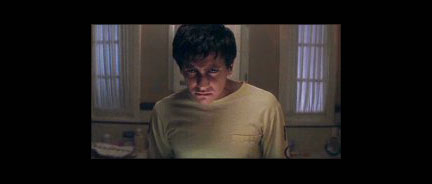
Many people I've encountered seem content to take Donnie Darko (2001) at face value, appreciating its artistic value, but no one else seemed willing to admit that they may've felt like there was a cohesiveness to the plot that felt just out of reach. I went in pursuit of answers, starting with www.donniedarko.com. The Web site is presented as a series of puzzles for visitors. Without too much effort, you can acquire a copy of Roberta Sparrow's manuscript, "The Philosophy of Time Travel". It's only about 1000 words and can also be found on the DVD. I was very excited to discover that there is indeed a back story to the movie, elucidated mostly by Sparrow's book. Allow me to share my interpretations, coupled with my own opinions about the story's meaning. Many of the following ideas are my own conjectures and accordingly, are subjective. These are just my interpretations, though I think this page should be enlightening to fans of the movie.
Recall that during his talk with Dr. Monotoff (Noah Wyle's character) they discuss the formation of wormholes in space-time. They can form at complete random, and the only "artifacts" that can move through wormholes without being destroyed are metal vessels of some sort (such as a jet engine...). As Sparrow describes it, "The Fourth Dimension of Time is a stable construct, though it is not impenetrable." The wormholes form as a result of this marginal instability. Bear in mind that time is just another dimension by which the universe is measured, and it is not mere philosophical fantasy to talk about it being manipulated like any other dimension (consider the observed case of time passing more slowly for one object with movement relative to another object--inconsistencies exist that are difficult to understand).
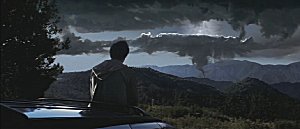 On October 2nd, 1988, an artifact from out of nowhere landed in what Sparrow calls the "Primary Universe"--life as we know it. The origin of this artifact, the jet engine, is a "Tangent Universe", created when the jet engine blew through the wormhole and into a day that had already happened, October 2nd. The artifact marks the arrival of the Tangent Universe. If you've been observant you'd realize that this introduces paradox--the Tangent Universe from which the jet engine came did not exist until the jet engine exited its domain via the wormhole, hmm.
These paradoxes are inevitable when dealing with time travel. They don't fully discount the possibility of time travel, they just mystify it beyond any sort of simple comprehension. I find that it's easier to visualize the two universes if you imagine the Tangent Universe actually "happening first". After 28 days of a turbulent existence, the Tangent is erased when the story jumps back to October 2nd in the stable Primary Universe (of course, this is just a model for visualization, these universes existed concurrently).
On October 2nd, 1988, an artifact from out of nowhere landed in what Sparrow calls the "Primary Universe"--life as we know it. The origin of this artifact, the jet engine, is a "Tangent Universe", created when the jet engine blew through the wormhole and into a day that had already happened, October 2nd. The artifact marks the arrival of the Tangent Universe. If you've been observant you'd realize that this introduces paradox--the Tangent Universe from which the jet engine came did not exist until the jet engine exited its domain via the wormhole, hmm.
These paradoxes are inevitable when dealing with time travel. They don't fully discount the possibility of time travel, they just mystify it beyond any sort of simple comprehension. I find that it's easier to visualize the two universes if you imagine the Tangent Universe actually "happening first". After 28 days of a turbulent existence, the Tangent is erased when the story jumps back to October 2nd in the stable Primary Universe (of course, this is just a model for visualization, these universes existed concurrently).The instability of the the Tangent Universe meant it would collapse within weeks, destroying all existence with it (as Sparrow explains). Ultimately, Donnie Darko closed the wormhole by ensuring the artifact's passage through it, back to the Primary Universe (which would seem to be the "second" time it happened, but again, time travel presents paradoxes). In doing so, the jet engine was sent back hurdling toward the Darkos' house, except this time Donnie knew it was coming. Donnie just smiled, because he knew that he had restored the world to its proper state, and in doing so, saved Gretchen, his mother, and his sister (an airplaine missing an engine doesn't stay in the air too long). Donnie was only able to find the courage to accept death because he knew he wasn't dying alone. By his brief but profound relationship with Gretchen, Donnie overcomes his fear of dying alone. Recall the dichotomy of fear/love theme (complemented by the Primary/Tangent dichotomy) that was r einforced by the role of self-help guru, Jim Cunningham, throughout the film. Donnie fights this battle and ultimately overcomes his fear by finding love in Gretchen. In the end, Donnie not only saved those closed to him, but the world and all of existence. It appears that in some way he understood all of this. More light will be shed on why shortly.
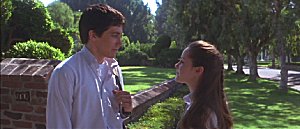 Gretchen: "Donnie Darko? What the hell kind of name is that? It's like some sort of superhero or something." This was a bit of a foreshadowing. The Philosophy of Time Travel makes it clear that this movie is more than just a strange journey for one boy; it's a story of heroism and even martyrdom. Was it necessary for Donnie to die? It could be argued that Donnie could've avoided the jet engine to save his own life and still have ensured the stability of the Primary Universe, as The Philosophy of Time Travel would suggest. I suspect it just made for a better story and a better hero if Donnie were to die. Seeing Gretchen asking about who died is pretty mindblowing, afterall. It also makes it very clear to the viewer that setting is an entirely new branch of space-time.)
Gretchen: "Donnie Darko? What the hell kind of name is that? It's like some sort of superhero or something." This was a bit of a foreshadowing. The Philosophy of Time Travel makes it clear that this movie is more than just a strange journey for one boy; it's a story of heroism and even martyrdom. Was it necessary for Donnie to die? It could be argued that Donnie could've avoided the jet engine to save his own life and still have ensured the stability of the Primary Universe, as The Philosophy of Time Travel would suggest. I suspect it just made for a better story and a better hero if Donnie were to die. Seeing Gretchen asking about who died is pretty mindblowing, afterall. It also makes it very clear to the viewer that setting is an entirely new branch of space-time.)But why did Donnie contain the sole power to "save the world"? This question is actually answered in detail in Sparrow's book. Donnie was the closest to the artifact when it came through the wormhole. This means he must become "The Living Receiver", whose mission is to guide the artifact back to the Primary Universe. Being the Living Receiver affords Donnie a few actual "super powers", including "strength, telekinesis, mind control, and the ability to conjure fire and water", according to the book. In the case of strength, consider that he wedged an axe into a bronze statue. As for water, his mind seemed to set off the sprinklers at Cunningham's house upon finding the wallet out front. This could be considered a foreshadowing of his torching of the house, perhaps even ironic (fire/water).
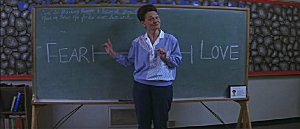 Without knowing it, Donnie is being guided by invisible forces that are willing him through his mission to restore the artifact to the Primary Universe. The book also describes people known as "The Manipulated Living" that are unknowningly aiding the Living Receiver in his task. The Manipulated Living are those that were near Donnie and the wormhole when the artifact appeared. Like Donnie, they are under the control of an indetectable force (as if the Universe was willing itself back to normal, or perhaps it was the will of God?) All people, living and dead, that were in the proximity of the wormhole become unknowingly adherent to a predestiny that will restore the Primary Universe. In this sense, I think that Donnie only becomes a true hero when he dies upon returning to the Primary Universe, because all time spent in the Tangent Universe
seems to be without true free will, acting under the spell of being the Living Receiver (if we take Sparrow's words to be factual).
Without knowing it, Donnie is being guided by invisible forces that are willing him through his mission to restore the artifact to the Primary Universe. The book also describes people known as "The Manipulated Living" that are unknowningly aiding the Living Receiver in his task. The Manipulated Living are those that were near Donnie and the wormhole when the artifact appeared. Like Donnie, they are under the control of an indetectable force (as if the Universe was willing itself back to normal, or perhaps it was the will of God?) All people, living and dead, that were in the proximity of the wormhole become unknowingly adherent to a predestiny that will restore the Primary Universe. In this sense, I think that Donnie only becomes a true hero when he dies upon returning to the Primary Universe, because all time spent in the Tangent Universe
seems to be without true free will, acting under the spell of being the Living Receiver (if we take Sparrow's words to be factual).Also affected by the Tangent Universe are "The Manipulated Dead". These people are said to be more powerful than the receiver himself, but can only manifest themselves in water. Anyone that dies in the Tangent Universe can contact the Living Receiver. Their motivation is to guide the Living Receiver in his task, because they aim to escape their oblivion (which will be finalized if the receiver fails). The mysterious liquid that seemed to pull people about can be explained as the presence of the Manipulated Dead, provoking Donnie and others around him to follow the path that ultimately will lead to the restoral of the artifact. It's an infinitely complex series of causes and effects that carry Donnie through the 28 days, but somehow all of the manipulated persons carry some innate, subconscious understanding of it, and facilitate that exact sequence of actions that will allow restoration of the Primary Universe. Clear large-scale examples of these causes and effects can be observed throughout the movie, such as Frank telling Donnie to burn down Jim's house, which ultimately causes his mother and sister to ultimately get on the plane that would fly into the wormhole and return the artifact.
As for Frank, he is indeed a hallucination of Donnie's. The Living Receiver is "tormented" by such hallucinations, according to The Philosophy of Time Travel. Frank represents a manifestation of the invisible impetus that is pulling Donnie along his path toward restoring the Universe. This is all made more intriguing given that we know Donnie Darko is schizophrenic. Furthermore, in the DVD's deleted scenes you can discover that the psychiatrist was only giving Donnie placebos, so Donnie was at the mercy of his condition during the story. This introduces an array of new possibilities, such as the scenario in which the entire movie is only some vivid hallucination of an intensely troubled individual. I think that it's more exciting to try to discern what Donnie's actually experiencing, knowing that he is both schizophrenic and under the influence of some sort of cosmic spell. Another scenario would be that Donnie's not schizophrenic at all, because that diagnosis is only made within the Tangent Universe (when Donnie has revealed his hallucinations about Frank). I don't suspect this is the case, because when Dr. Thurman asks about Donnie's new friend, she prefaces it with "Real or imaginary?". This would suggest Donnie was pretty mentally disturbed prior to October 2nd.
At the end of Sparrow's manuscript, she describes the effects after the restoration of the Primary Universe on those that were among the manipulated. Most don't retain any knowledge of it. When they do, they suffer immense pain and sometimes regret from the events. On donniedarko.com, you can discover in an epilogue revealing that Jim Cunningham commits suicide 10 days later, which seems only logical if he somehow retained some of the events of the Tangent Universe (he didn't kill himself in the Tangent Universe, so what other cause could their have been?) Furthermore, the story says that nothing was found in his house, regarding the children's pornography. These seem to be strong clues supporting the fact that the manipulated living retain at least some level of subconscious knowledge of their tangent existence in the alternate universe. In Jim's case, he was consumed with so much shame and guilt, he took his life
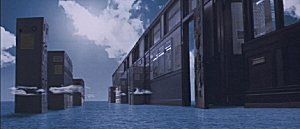 Not to be overlooked, are the emotional themes throughout the movie. As mentioned, themes of fear and love compete throughout the movie. Toward the end of the film there is an interlude during which "Mad World" by Gary Jules plays, a very somber piece. I think this part is a strong reminder that this film is about more than a bizarre time travel story. It really casts light onto the human experience and just how much so many of us suffer but just continue to go through the motions of our every-day lives. "All around me are familiar places, worn out faces" - this line from the song seems a perfect account of life in the Tangent Universe. "I find it kinda funny, I find it kinda sad, the dreams in which I'm dying are the best I've ever had." - this certainly seems like something Donnie Darko would say, doesn't it? "The tears are filling up their glasses, no expression, no expression at all." Wow, that just makes me want to run out and buy balloons or something festive....
Not to be overlooked, are the emotional themes throughout the movie. As mentioned, themes of fear and love compete throughout the movie. Toward the end of the film there is an interlude during which "Mad World" by Gary Jules plays, a very somber piece. I think this part is a strong reminder that this film is about more than a bizarre time travel story. It really casts light onto the human experience and just how much so many of us suffer but just continue to go through the motions of our every-day lives. "All around me are familiar places, worn out faces" - this line from the song seems a perfect account of life in the Tangent Universe. "I find it kinda funny, I find it kinda sad, the dreams in which I'm dying are the best I've ever had." - this certainly seems like something Donnie Darko would say, doesn't it? "The tears are filling up their glasses, no expression, no expression at all." Wow, that just makes me want to run out and buy balloons or something festive....In summary, the movie accounts a natural phenomenon, a wormhole and the formation of a parallel universe, through the eyes of the most signifcantly affected human figure involved, Donnie Darko. By virtue of some sort of cosmic law, Donnie is set into motion on a path to restore the extremely fragic, turbulent Tangent Universe back to the normal Primary Universe. The strongest actor in Donnie's life is "frank", a hallucination that has come into existence (in Donnie's mind) to aid Donnie in his task. Through the eyes of (an assumed) schizophrenic, we can never really know for sure what Donnie experienced during those 28 days. What we know with confidence is that during his tenure as the Living Receiver, Donnie finally overcame his fears of death and loneliness, finding love in Gretchen. In his death, Donnie finally found peace. In his own words,
"I hope that when the world comes to an end, I can breathe a sigh of relief, because there will be so much to look forward to."